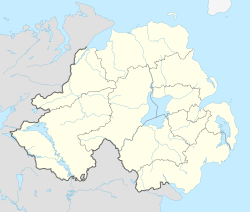2009 Massereene Barracks shooting
| Massereene Barracks shooting | |
|---|---|
| Part of the dissident Irish republican campaign | |
| Location | Massereene Barracks, Antrim, County Antrim, Northern Ireland, United Kingdom |
| Coordinates | 54°43′18″N 6°13′51″W / 54.7216°N 6.2307°WCoordinates: 54°43′18″N 6°13′51″W / 54.7216°N 6.2307°W |
| Date | 7 March 2009 ~21:40 (UTC) |
|
Attack type
|
Ambush |
| Weapons | AKM automatic rifle |
| Deaths | 2 soldiers |
|
Non-fatal injuries
|
2 soldiers, 2 civilians |
| Perpetrator | Real IRA |
On 7 March 2009, two off-duty British soldiers of 38 Engineer Regiment were shot dead outside Massereene Barracks in Antrim town, Northern Ireland. Two other soldiers and two civilian delivery men were also shot and wounded during the attack. An Irish republican paramilitary group, the Real IRA, claimed responsibility.
The shootings were the first British military fatalities in Northern Ireland since 1997. Two days later, the Continuity IRA shot dead a Police Service of Northern Ireland (PSNI) officer; the first Northern Irish police officer to be killed by paramilitaries since 1998. These attacks marked the beginning of the most intensive period of "dissident republican" activity since the start of their campaign.
From the late 1960s until the late 1990s, Northern Ireland underwent a conflict known as the Troubles, in which more than 3,500 people were killed. More than 700 of those killed were British military personnel, deployed as part of Operation Banner. The vast majority of these British military personnel were killed by the Provisional Irish Republican Army (IRA), which waged an armed campaign to force the British to negotiate a withdrawal from Northern Ireland. In 1997 the IRA called a final ceasefire and in 1998 the Good Friday Agreement was signed. This is widely seen as marking the end of the conflict.
However, breakaway groups opposed to the ceasefire ("dissident Irish republicans") continued a low-level armed campaign against the British security forces in Northern Ireland (see Dissident Irish Republican campaign). The main group involved was an IRA splinter group known as the 'Real' IRA. In 2007, the British Army formally ended Operation Banner and greatly reduced its presence in Northern Ireland.
...
Wikipedia

